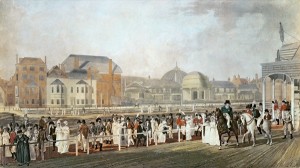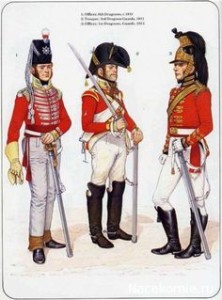Lydia received an invitation from Mrs. Forster,the wife of the Colonel of the regiment, to accompany her to Brighton. This invaluable friend was a young woman, and very lately married.
Spring, 1812.
Early on a bright morning in late May, a gay party left Meryton: the girls, Lydia and Mrs. Forster, with the latter’s little maid, traveled all day in Colonel Forster’s chaise, driven by a coachman, as the colonel rode with the regiment. By three o’clock they were on the high Downs, outside the Ramparts of Brighton, the sea a glittering line directly ahead.
Lydia, wild with excitement, hung halfway out the carriage window. “I can see it! I can see it!” she screamed. “’Tis the camp! I see the tents! Oh! Is it a parade, Harriet?”
Mrs. Forster peered around the bouncing Lydia, with the sedateness of a married woman who was seventeen to Lydia’s sixteen, and the experience of one to whom Brighton was old hat, she having been there on her honey-moon, three months earlier.
“It is,” she confirmed. “There is always something of the sort going on, marching or a review, on the Downs up to the racecourse. The whole town turns out every afternoon. See all the carriages?”
“I’ve never seen so many at once!” marveled Lydia. “What fine barouches – and landaulets – Why! There’s even a fish cart. But the carriages are all getting in amongst the tents, and the ranks of men. How can they ever march? What a confusion! How funny they look!”
“The spectators drive in as close as they can, so as to see better. It makes the officers wild, I can tell you.”
Lydia’s eyes were wide as saucers. “There are too many tents to count! I declare there must be hundreds. And the soldiers! Did you ever see so many soldiers in one place before, Harriet?”
“Why, there were almost as many, when we were here last. But to be sure there are more now,” she smiled with a superior air.
“I think it is beautiful, quite beautiful,” sighed the little maid, Sophy. “The red coats, oh! The handsome gentlemen.”
“There must be two or three regiments at least,” exclaimed Lydia, fanning herself, her eyes fluttering, quite overcome.
“Oh, yes, regulars and militia both,” Mrs. Forster assured them, already an officer’s wife. “Thousands of men.”
“Thousands!” Lydia gasped.
“Remember they are not all officers,” Mrs. Forster reminded her, “and it is only with officers we can have any thing to do. Well, you could marry a trooper, Sophy – but I beg you not; I need your services for awhile yet.”
“Oh, I wouldn’t never leave you, ma’am, it is too exciting,” the girl breathed.
“There, Lydia, now we are turning toward the town. Brighton itself. You see the ladies and gentlemen walking on the Steine – that big grassy area – and the two Assembly rooms, opposite, the Castle and the Old Ship. Two! Not many towns have two Assemblies, I can tell you. And so elegant, with eating-rooms, and card-rooms, and dancing in the evening, you never saw any thing like it. We bathe in the morning – before seeing the officers assemble; and afterwards we promenade, and go to the libraries.”
“The libraries?” Lydia’s face fell. “I did not come to Brighton to read. I get enough of that at home, with my sisters telling me to mind my book.”
“Silly,” laughed Mrs. Forster, “the libraries are where ladies can play cards, and billiards, and oh! They are near the prettiest shops you ever saw in your life, Lydia. Such hats, and ribbons, and muslins, and chintzes! You will die. I hope you brought plenty of money, but it’s no matter if you haven’t, you may borrow of me.”
The carriage turned into a narrow street lined with blue and buff houses. “We are not too near the Marine Parade, that is where the Prince lives,” said Mrs. Forster importantly, “but then we are not the Prince’s Regiment, and that makes a difference. That is for the aristocracy, but it is not nearly as much fun as our regiment. We are in a very genteel street however, and you will like our rooms.”
Lydia did like their pretty lodgings in a green-painted hotel in the old cobbled Lanes. She dressed faster than the others and stood in the bow window, eagerly watching the promenaders in the street. Beyond, the vista led between the buildings to the yellow sands beyond and the sparkling sea. Flags waved, and white boats tossed on the water, but Lydia’s eyes were on the officers and their ladies in their really smart finery.
Mrs. Forster came up beside her and passed her arm around her. “Do you like Brighton, then?” she inquired laughingly.
“Oh yes! Can we go out right away, and walk with all those people? They are so very fine. And when shall we see the officers?”
“Indeed we can promenade now, though I wish you had a prettier bonnet.” Mrs. Forster tilted her head and eyed her friend critically. “That feather is impossible, nothing like it has been worn in three seasons, but what can you expect of Meryton. Never mind. I will undertake to find you a fine match before you’ve been here a month. What am I saying? You so handsome, and only turned of sixteen. Two weeks, and a colonel at least!”
“There are so very many officers, I believe I really could have my choice,” Lydia breathed, her eyes shining. “Though it does seem a pity to have to settle for just one. What if you see a handsomer one afterwards?”
“You may marry as many as you like, or not marry them at all and play them off against each other, for all that I care, my dear. Look! Here comes Colonel Forster, with Denny, and all the others – they’ve come to take us to walk on the Steine, I know. I hope they’ve taken tickets for one of the Assemblies, or the theatre, for the evening. Have you got your lace shawl? Oh, what a dowdy thing that is, you’ll have to get another.”
“Yes, it belonged to my sister Jane. To be sure, I only ever rated hand-downs, that is how things are in my family. Never mind, it’s so warm I’m sure I shan’t need it. Harriet! All our very own set of officers – not only Denny, but Captain Carter and, yes! it is! I see Mr. Wickham, I do! Oh! He is the most beautiful of all! Could there ever be a handsomer man?” Out came her handkerchief and she jumped up and down, waving from the window.
Mrs. Forster was not the one to play propriety, and rather than attempting to restrain Lydia, she impatiently pulled her friend’s hand, and they rushed through the door and out into the street, to waylay the officers.
 Prince of Wales at Marine Parade
Prince of Wales at Marine Parade
(Diana will be heading to England the day this is posted, though you will not find her in Brighton chasing officers!)



13 comments
Skip to comment form
Well! It is hardly surprising that Lyd[a was able to run away with Wickham. She was positively encouraged. But how her parents could consider a 17 year old a sufficient guardian is beyond me. However I think that Lydia would have found a way to do as she pleased regardless. I would say that she was lucky that Darcy thought so much of Elizabeth that he was determined to solve the problem although I would not envy her being married to such a man. Thanks for the post – it is nice to have these extra chapters.
Author
Thanks for commenting, Glynis. I think Mr. Bennet trusted to Colonel Forster’s good sense to keep Lydia in line, rather than his young wife – but we know that was poor judgement on his part!
I was in Brighton this summer and the descriptions in the story are fascinating. It is nice to be able to envision the setting with a bit of knowledge of the area.
Author
Kristine, how lucky! It would be fun to look around at buildings Lydia would have seen. The Pavilion hadn’t been built yet in its present “Indian” form, I know.
Lydia is so predictable. Run after the men. I would be to enthralled with my first view of the sea!
Brighton was too dangerous a place for that child.
Author
Brighton was quite the dangerous place in Jane Austen’s day!
Lydia is turning into a replica of her mother. Very unfortunate. Somehow, Brighton is not the place for Lydia, especially in the company of Harriet. Unfortunately, Harriet is as bad as Lydia and with her married to the Colonel, she’s worse. What a disaster! Two twits in a town filled with soldiers.
“Two twits in a town filled with soldiers.”
Exactly!! Well phrased, Carol!! 🙂
Lydia is just…so…Lydia. I wasn’t sure that there was anyone as vacuous as she, but Harriet Forster may indeed win the prize.
Warmly,
Susanne 🙂
exactly Carol.
Author
The most dangerous thing about Harriet Forster is that she has the freedom of a married woman, with no more sense than Lydia. What a friend for Lydia to have – like gunpowder!
I believe Mr. Bennet said “…she (Lydia) is luckily too poor to be an object of prey to anybody.” What a naïve and thoroughly lazy man! Not to consider (and all fathers must KNOW this) that there is more than one reason a man might pay attention to a girl, much less to one who throws herself at any man who looks her way.
I was always wondering how Harriet “captured” the attentions of Col. Foster. Did she have a dowry to significance? Or did he truly love her? That is another story out there. She certainly was not to be trusted to chaperon any girl of only 15/16 years of age.
Well, Lydia and Harriett Foster are two peas in a pod. No wonder Lydia found it so easy to run off with Wickham. Mr. Bennet put his trust in the wrong person, but we already knew that. The man positively had his head in the sand. How could anyone trust a married child of 17 to chaperone a child of 16. And doesn’t Bennet realize there are things other than a dowry that will attract a man….a girl who throws herself at one and is loose? So true to character and so believable.
I agree with Sheila – the story of the Forsters’ courtship and marriage would make an interesting challenge for a writer. The fact that Colonel Forster chose to marry such an airhead shows his own lack of good judgment. After the war ended and the militia disbanded, who knows what the Forsters’ marriage would be like.
Diana, you do such a brilliant job of describing Lydia’s thinking – please tell me you do not have an inner Lydia!! XD